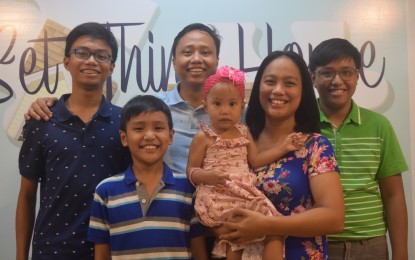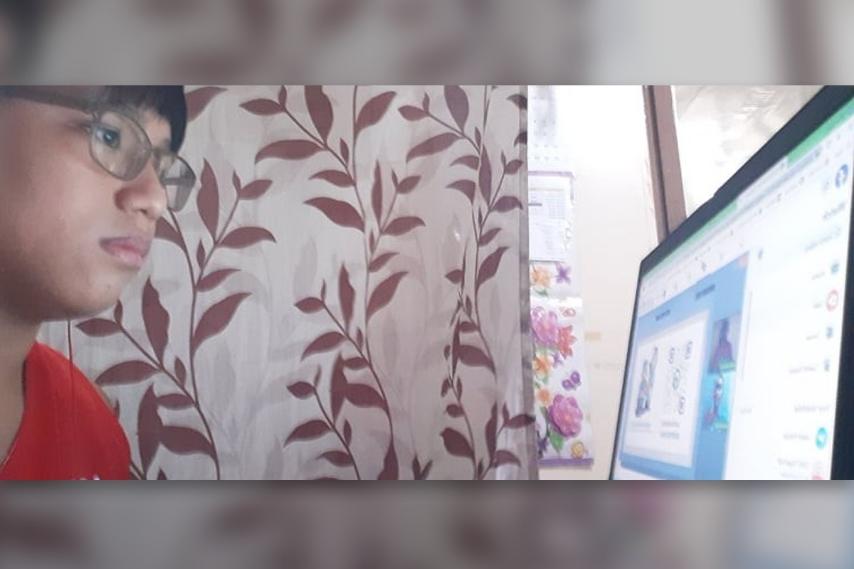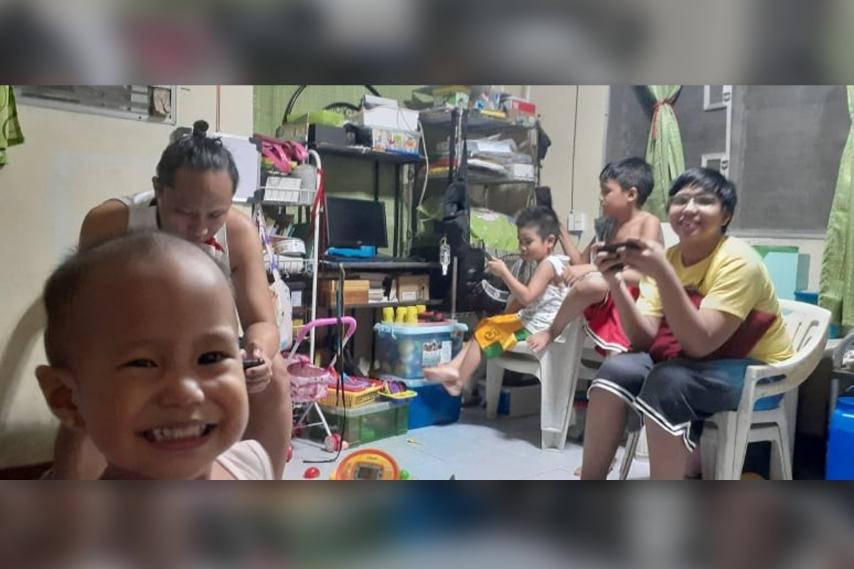
LEARNING FROM ADOLESCENCE. Maria Kenneth Agtarap, a 38-year-old mother from Cavite, smiles with her husband, three sons, and a toddler daughter in this undated photo. Agtarap shared her experiences and strategies in raising adolescents in a pandemic setup, in time for the celebration of International Adolescents Health Week. (Courtesy: Maria Kenneth Agtarap)
MANILA – Watching your children sail through the turbulent waters of adolescence could be one of the most challenging stages for parents. But with proper perspective and reinforcement, such a phase could be a breeze and actually be subtly enjoyed.
Maria Kenneth Agtarap, 38, a mother of four children from Dasmarinas, Cavite, said she has had her significant share of experience.
As she raises three young boys and a toddler girl, two of which are in their adolescence, Agtarap can’t help but recount moments that seemed like both an "extra challenge" and a learning experience for her and her husband Lawrence, especially during the onset of lockdowns due to the coronavirus disease 2019 (Covid-19) pandemic.
“Ito ‘yung mabigat sa 'teens' kasi adjustment na sa life stage tapos nakulong pa sila. Extra challenge ang 'social skills' sa kanila, may social distancing eh (This is what’s heavy for teens because they are in the stage of life adjustment, then they are staying at home, [it is an] extra challenge for their social skills due to social distancing),” she told the Philippine News Agency.
Throughout the challenging and chaotic two-year pandemic, Agtarap and her family still managed to build a stable routine around their household.
“May daily routine and chores naman talaga sila. Mas nag-level up na lang din for kuyas kasi involve na sila sa cooking (They have daily routine and chores even before the pandemic. But now, it has leveled up because they are now involved in cooking), especially Lance in particular,” she added, referring to their 13-year-old son.

Though engaged in household chores, Agtarap admitted there are still days that his sons become more interested in mobile games.
“Wala naman problem sa schooling bukod sa 'pag tinamad kasi mas sipag sa laro sa cellphone. Masipag si teacher mag-report kaya wala siya lusot. Pino-post ni teacher ang Excel file ng mga nag-submit and mga hindi. Kita lahat ng parents and classmates kaya yari siya sa akin (There’s no problem in schooling but they become lazy when their mobile games get in the way. However, the teacher is diligent enough to report and post Excel files of those who have submitted and those who have not. All parents and classmates have access to them so they can't get away with it.),” she said.
Testing, failing, learning
Though she has somehow struck a balance between the demands of managing a household and sharing light bonding moments with their children, Agtarap said there are still times she finds her sons "testing the waters" and limits of their freedom.
“Mahilig sila mag test ng limits. May pagka-ganun personality din kasi nila... lalo if from me... parang ayaw nila maniwala or gusto nila na ma-prove akong wrong. ‘Pag si papa nila minsan magsabi again ayun, napapaisip sila (They want to test limits, their personalities are somehow like that, most especially if it’s me, seemingly, they don’t want to believe me or they want to prove I’m wrong, but if it’s backed by their father, they’re thinking about it),” she said.
This behavior is typically observed among adolescents according to the Society of Adolescent Medicine of the Philippines (SAMPI).

In an International Adolescent Health Week video posted in Oplan Kalusugan sa Department of Education (OK sa DepEd) on Friday, Dr. Jimmy Dumlao II, SAMPI Pediatrician and Adolescent Health Expert, reminded parents that adolescents are developing individuals eager to gain independence.
“At this stage nag-a-assert siya ng independence niya, so kailangan nating i-acknowledge na nandun siya sa stage na ‘yun. However, we have to temper din ‘yung pagbibigay natin ng freedom sa kanya (At this stage, [they] are asserting independence, so we need to acknowledge that [they] are on this stage. However, we have to temper the scope of freedom we are granting),” he said.
Dumlao mentioned the need to set absolute "non-negotiables" for adolescents to ensure a healthy environment.
“I-memention natin na hindi ‘yan negotiable, hindi ‘yan pu-pwede, mali ‘yang ginagawa niya, pero ite-temper natin kung hindi naman ganung nakakasama or it won’t hurt others naman, himself, or herself, bigyan natin ng chance na magkamali (We should mention 'that’s non-negotiable, that’s not allowed, that’s wrong.’ But we will temper it if it doesn’t hurt others, himself, or herself, let’s give room for mistakes). Because it’s only when we get to fall, that we get to learn,” he said.
Amid all these, Agtarap noted that it is best to pray and be grateful to witness such a stage in a youth's life.
“Siguro best would be to never stop praying. Be grateful lang din. Always keep in mind that it's a 'stage' in life kaya maging (that’s why we should be) consistent lang din, you know? Lilipas at lalagpas din sila doon. Basta tayo, moms, laging nandyan (it will surely come to pass, but as moms, we should always be here), as always,” she said. (PNA)
